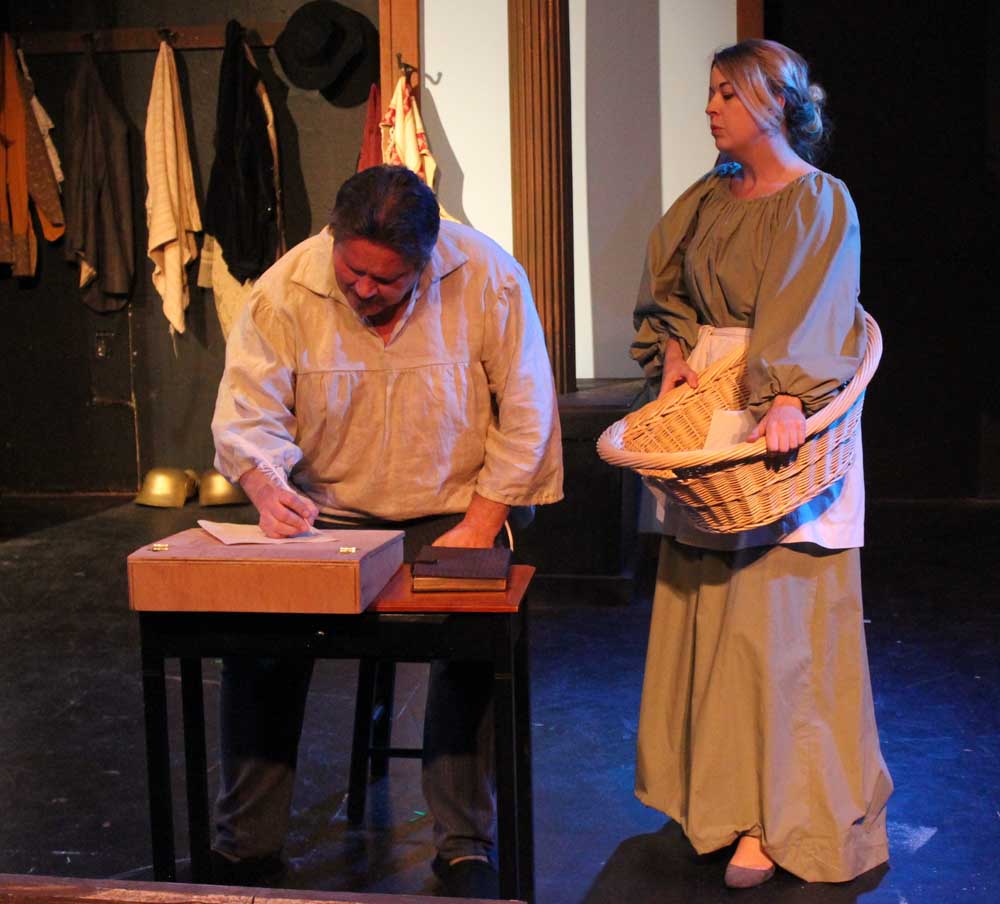Shakespeare learns the art of ‘Equivocation’ at 2nd Street Theater
Published 12:00 am Thursday, January 11, 2018

- Michael Axel, left, as Shagspeare, performs alongside Emilty Cady in "Equivocation," a play that imagines a scenario in which Shakespeare has been commissioned as a government propagandist.
With “Equivocation,” playwright Bill Cain imagines a scenario in which William Shakespeare, known for comedies, tragedies and histories, turns his attention to a current event — at the behest of his government.
“The basic gimmick is the Gunpowder Plot. That was Nov. 5, 1605,” explained director Rick Jenkins. “It’s an interesting thing, because for decades, maybe longer than that, it had been illegal for playwrights to write about current events. Shakespeare wrote histories about the royal family, but generations back. You were not allowed to write about current events … they wanted to control public perception.”
And they still do, in Cain’s play. In fact, it’s the prime minister, Robert Cecil, who on behalf of King James I, asks, flatters and cajoles Shagspeare (as the Bard is dubbed here) into writing a play about the conspiracy to blow up Parliament with 36 barrels of gunpowder.
“Their idea is, really, to control the spin, to have the greatest writer of the time create the myth, the story, about what really happened, so that it would become the official version, and everybody would believe it,” Jenkins said.
Being attached to his head, Shagspeare can’t really decline the offer, and he has his work cut out for him. King James is also something of a scribe, and Cecil wants Shagspeare to write the play based on the King’s official account. Shag as he’s known to his friends, doesn’t cotton to lifeless black and white villains and heroes, and without the plotters’ intended explosive ending, there’s not much of a story arc to work with.
Actor Michael Axel does a great job of making human the overwhelmed Bard, who may be in over his head as he tries to uncover the facts of the plot, satisfy his obligations to Cecil (Richard Mueller) and the King (Clinton Clark), avoid both treason and becoming a government propagandist, placate Richard Burbage (Ed Victor) and their Globe Theater cohorts, and perhaps even patch up his strained relationship with his daughter, Judith (Emily Cady), the twin of Shag’s dead son.
That’s a lot of serious business to address in two acts. Though many of its aims are lofty, there’s clever fun to be had in “Equivocation.” Case in point: Early in the proceedings, Judith admits to hating the unnatural technique of using a soliloquy — in a soliloquy, of course.
With the exceptions of Axel and Cady, each of the actors, including Shane Ketterman as Armin, Catesby and others, portray multiple characters in the engrossing drama. And given the meta nature of the play, there are scenes in which real life bleeds over into Globe company actors attempting to grapple with the resulting material in rehearsals for the Gunpowder play, so explosive the scripts are kept under lock and key.
Questions arise as Shagspeare digs deeper in his attempts to flesh out the story. How exactly did the conspirators dig a tunnel under Parliament, under the nose of Cecil — who’s so well-informed he somehow got his devious hands on one of Shag’s early drafts of the Gunpowder play, and claims to know the location of every pepper flake in London.
Further, how did the conspirators stop water from nearby River Thames from leaking into said tunnel? Where did all the dirt from such a tunnel project wind up?
Cecil reluctantly permits Shag to interview the imprisoned plotters, who begin to stir sympathies in Shag, despite the fact that he’s there to create fake news. Among the prisoners is the wise Henry Garnet (Victor), a priest who, despite the political events he’s caught up in, remains true to himself and his notion of truth. Shag implores Garnet to explain to him the art of equivocation, the truth behind the lie.
“Now, we just think of an equivocator as a liar. But in this time, if you tell a lie, it’s a sin. If you take an oath before God to tell the truth, you go to hell for lying. This is a way for Catholics to tell the truth so you don’t go to hell.”
Rather than the commissioned play, Shag ultimately writes a metaphor for the Gunpowder Plot — “Macbeth,” so full of concealed truth (and witches — James likes witches) that it evokes a strong reaction from Cecil.
Some believe Shakespeare wrote “Macbeth” as a metaphor for the Gunpowder Plot, Jenkins said.
“He did write covertly about current events,” Jenkins said, noting “King Lear,” one of the many plays Shakespeare wrote after the Gunpowder Plot — and after a bit of a dry spell — as an example. In that play, the king wants to retire and attempts to divide his kingdom among his three daughters, which ends poorly for all of them. At the time, King James I, wanted to unite his Scottish and English kingdoms.
“‘Lear’ was, I believe, a piece of propaganda supporting unity, to show what divisiveness could do,” Jenkins said.
And in “Macbeth,” the simple use of the word “train” is also a loaded reference to the Gunpowder Plot.
“The fuse, when you roll out gunpowder and it burns back and blows up, that’s called the ‘train,’” Jenkins said. “The audience would react to that meaning of it.”






